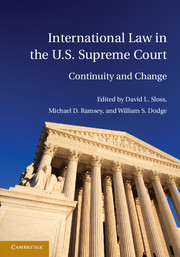Book contents
- Frontmatter
- Contents
- List of Contributors
- Table of Cases
- Acknowledgments
- Introduction
- PART I FROM THE FOUNDING TO THE CIVIL WAR
- PART II FROM THE CIVIL WAR TO THE TURN OF THE CENTURY
- PART III FROM THE TURN OF THE CENTURY TO WORLD WAR II
- PART IV FROM WORLD WAR II TO THE NEW MILLENNIUM
- PART V INTERNATIONAL LAW IN THE U.S. SUPREME COURT IN THE TWENTY-FIRST CENTURY
- V.A TREATIES AFTER 2000
- V.B CUSTOMARY INTERNATIONAL LAW AFTER 2000
- V.C INTERNATIONAL LAW AND CONSTITUTIONAL INTERPRETATION AFTER 2000
- V.D INTERNATIONAL LAW AND STATUTORY INTERPRETATION AFTER 2000
- Main Essay – Empagran's Empire: International Law and Statutory Interpretation in the U.S. Supreme Court of the Twenty-First Century
- Response Essay – Loose Canons: International Law and Statutory Interpretation in the Twenty-First Century
- Response Essay – Empagran: Empire Building or Judicial Modesty?
- V.E INTERNATIONAL LAW AND THE WAR ON TERROR
- VI CONCLUSION
- Index
Response Essay – Empagran: Empire Building or Judicial Modesty?
Published online by Cambridge University Press: 05 July 2011
- Frontmatter
- Contents
- List of Contributors
- Table of Cases
- Acknowledgments
- Introduction
- PART I FROM THE FOUNDING TO THE CIVIL WAR
- PART II FROM THE CIVIL WAR TO THE TURN OF THE CENTURY
- PART III FROM THE TURN OF THE CENTURY TO WORLD WAR II
- PART IV FROM WORLD WAR II TO THE NEW MILLENNIUM
- PART V INTERNATIONAL LAW IN THE U.S. SUPREME COURT IN THE TWENTY-FIRST CENTURY
- V.A TREATIES AFTER 2000
- V.B CUSTOMARY INTERNATIONAL LAW AFTER 2000
- V.C INTERNATIONAL LAW AND CONSTITUTIONAL INTERPRETATION AFTER 2000
- V.D INTERNATIONAL LAW AND STATUTORY INTERPRETATION AFTER 2000
- Main Essay – Empagran's Empire: International Law and Statutory Interpretation in the U.S. Supreme Court of the Twenty-First Century
- Response Essay – Loose Canons: International Law and Statutory Interpretation in the Twenty-First Century
- Response Essay – Empagran: Empire Building or Judicial Modesty?
- V.E INTERNATIONAL LAW AND THE WAR ON TERROR
- VI CONCLUSION
- Index
Summary
Professor Ralf Michaels's analysis of Empagran is trenchant, apt, and persuasive. I do not wish to criticize it so much as suggest a different perspective that ties the decision to other historical patterns and contemporary trends. Professor Michaels sees the decision as primarily a one-off and jarring event. The Court does not normally stand up for price fixers, and the normative implications of any outcome in their favor are disturbing. But it is also possible to see the case as reflecting broader concerns about judicial capacity and civil justice in the U.S. legal system. It is just possible that such concerns might override the unambiguous cost of letting price fixers off the hook.
My suggestion is not that Empagran lacks an international dimension. Rather, I suggest that the opinion rests not on the abstract issue of extraterritorial jurisdiction, but on an empirical observation about comparative civil procedure. The decision makes sense if the Court, as it looks around the world, has concluded that there is something exceptional and possibly unwise about the way the United States conducts civil litigation. Forty years of case law indicates that the Court has reached exactly this judgment. Its unease has not led the Court to confront and reform the aspects of the U.S. litigation regime that make the system exceptional, but it has encouraged a certain modesty in the resolution of disputes about the extent of federal jurisdiction.
- Type
- Chapter
- Information
- International Law in the U.S. Supreme Court , pp. 553 - 558Publisher: Cambridge University PressPrint publication year: 2011
- 1
- Cited by



